#topic: the chitauri sceptre/mind stone
Text
Now, About That Sceptre
Based on hair growth, if nothing else, it seems that a fair amount of time must have passed between Loki's appearance in the post-credits of Thor (2011) and his dramatic entrance via the Tesseract in Avengers Assemble. Despite the apparent time jump, Loki's physical well-being is still clearly... not great. His appearance has improved in some ways from the horror show above (the burns have healed, his mouth isn't full of blood), but he shows a number of signs of heat exhaustion, at a minimum (something especially relevant because, remember, Loki's a Frost Giant). He's visibly exhausted and disoriented, he nearly collapses on multiple occasions, he's sweaty and pale with dark and sunken eyes. This is not a healthy man. And while there was maybe an argument to be made for his prior physical distress being contributable to the effects of the wormhole, whatever's happening here is all Thanos.

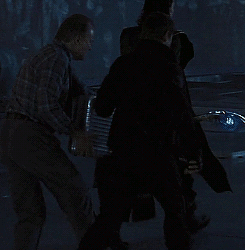
Beyond his immediate physical state, he comes across as paranoid, afraid—desperately fighting to get through just this one moment, and then the next, and then the next. If he just holds it together a little bit longer, he'll be safe. He'll be able to rest. Watch how he stumbles. Observe his deathgrip on the sceptre and on the truck rail. Look at his desperate facial expression and body language. He's trembling.
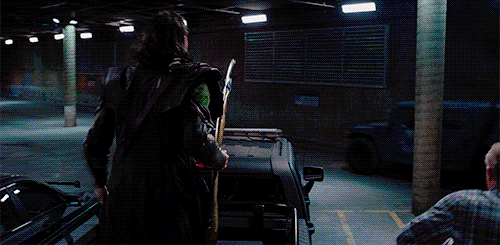

Now we're getting into psychology, and well... Loki says some odd things throughout this film. The Loki of Thor (2011) was clearly dealing with a mental health crisis, but the Loki of Avengers Assemble seems—not to put too fine a point on it—crazy. And he's not just crazy. His words and his body seem to, at times, be in direct conflict with one another. He may talk down to the humans, but he appears to take little pleasure in actually hurting them. And yet he summons an army of aliens with the expressed purpose of doing just that. He's sassy and grandstanding while facing the Avengers, but on the occasions where he's violent with civilians, as well as whenever he's alone, he appears to dissociate from himself. Look at his face. This is not remotely fun for him. He looks dead inside.
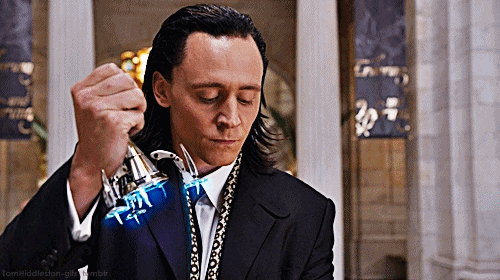

Overall, Loki's body language and facial expressions often betray a Loki who is struggling to justify his actions. He seems, at times, almost as though he is speaking to himself as much as he is taunting the Avengers or humanity. Here are some quotes/scenes that grab my attention.
For a start, there are these exchanges with Fury shortly after he first arrives via the power of the Tesseract:
Fury: "This doesn't have to get any messier."
Loki: "Of course it does. I've come too far for anything else."
"I am Loki of Asgard, and I am burdened with glorious purpose."
Loki: "I come with glad tidings of a world made free."
Fury: "Free from what?"
Loki: "Freedom. Freedom is life's great lie. Once you accept that, in your heart, you will know peace."
He goes on to reiterate his bizarre speech about "freedom" again in Stuttgart.
"The bright lure of freedom diminishes your life's joy in a mad scramble for power, for identity. You were made to be ruled. In the end, you will always kneel."
This all sounds a lot like indoctrination to me, and it's worth noting that the Black Order—for whom Loki is ‘working’ in this movie—is literally a cult. In fact, they use very similar rhetoric at the beginning of Avengers: Infinity War. Compare this to Loki's rhetoric on the nature of freedom:
"Hear me... and rejoice. You have had the privilege of being saved by the Great Titan. You may think this is suffering. No. It is salvation. Universal scales tipped toward balance because of your sacrifice. Smile, for even in death you have become Children of Thanos."
And then there's Loki's outburst directed at Natasha after the Avengers have taken him prisoner for the first time and she's trying to get information out of him:
"You lie and kill in the service of liars and killers. You pretend to be separate, to have your own code, something that makes up for the horrors. But they are a part of you and they will never go away!"
Before this moment, he seems relatively calm and in control. Something changes here; he becomes disgusted and aggressive. His words could easily be applied to himself as well. Here Loki is on Midgard, pretending to have his own agenda. "Something that makes up for the horrors". Yet as much as Loki claims to be free of sentimentality, we as the audience know better. We can see it in his microexpressions and his body language. We know of his being psychically linked to The Other. We see the nature of Loki's interactions with them: the tears in his eyes, the threats and his attempts to suppress and hide his fear, the pain they're able to inflict on him with just a touch.
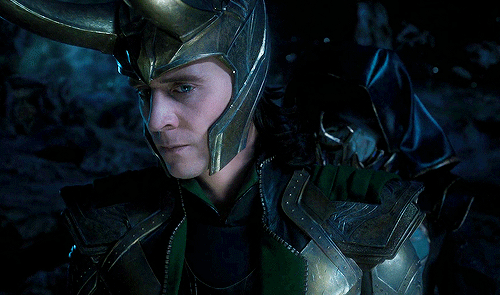

"If you fail, if the Tesseract is kept from us, there will be no realm, no barren moon, no crevice where he cannot find you. You think you know pain? He will make you long for something as sweet as pain."
There are also subtle indicators that Loki's memories might have been tampered with, such as his initial conversation with Thor.
"Our father—"
"YOUR father. He did tell you of my true parentage, did he not?"
"We were raised together! We played together, we fought together. Do you remember none of that?"
"I remember a shadow. Living in the shade of your greatness. I remember you tossing me into an abyss."
Yes, of course, it's possible that this is hyperbole on Loki's part. Regardless, it's worth noting as part of a pattern of bizarre, cult-like behaviours that Loki displays throughout the movie. It becomes even more noteworthy in light of the revelation that Loki was being influenced by the mind stone all the while. The specific phrasing Marvel uses is, "fueling his hatred over his brother." Does that include distorting his perception of what's happened between them? It's not conclusive, but it's certainly possible.
Now, Loki does at times appear to be genuinely enjoying himself. I'm not denying that or sweeping it under the rug. But look at the context. Notice when he seems to be the most amused. It's when he's grandstanding. It's when he's the center of attention. When people run screaming from him. When he's being interrogated. It's not the violence that pleases him; it's the recognition. For the first time in his life, he's center stage. He feels powerful. And Loki will always take negative attention over no attention at all.
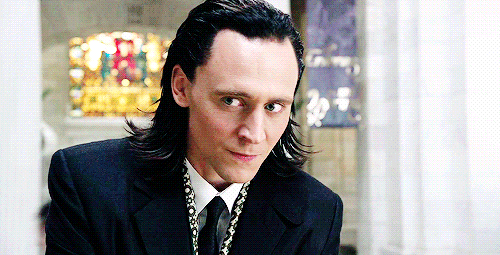
Simmer down there, you lovable maniac.
At the other end of the spectrum, however, we have moments like just before he stabs Thor, in which he looks at the destruction around him with legitimate panic and horror written on his face. As though he's awoken from a haze and is only just realising the extent of what he's done. (Side note: for the life of me, I'll never understand people who call Loki a psychopath. Every single time we've seen Loki hurt Thor, he does it literally with tears in his eyes. And yet Ragnarok would have us believe he's done so all throughout their childhood just for funsies).
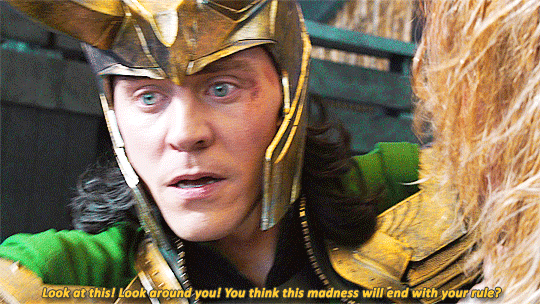
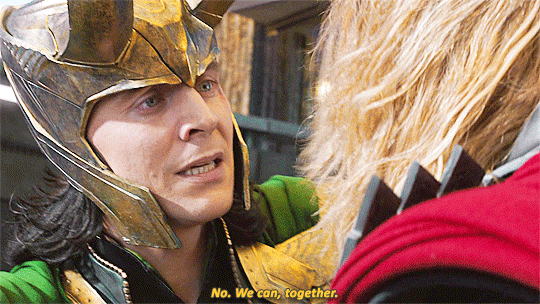
Surely this isn't the expression of a man who wants all this death and destruction—who's carrying out his own will. And why should he? Even if he truly meant to/cared about ruling Midgard, there's little reward in ruling a world of corpses.
Which brings us to our ultimate conclusion. As mentioned above, there have long been theories—now confirmed canon—that Loki was under the influence of the sceptre AKA the mind stone throughout Avengers Assemble. An observation I had missed initially is that some fans desperate to cling to Loki's identity as a Villain™ have differentiated between the total mind control of Barton and Selvig and the 'influencing' of Loki's behaviour via the sceptre. But note that the same language is used for both instances:
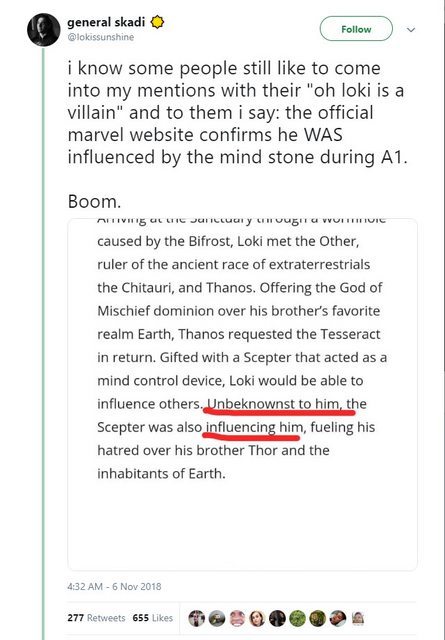
"Gifted with a sceptre that acted as a mind control device, Loki would be able to influence others. Unbeknownst to him, the sceptre was also influencing him."
I do believe that the mind control over Loki was less effective; he clearly maintained some measure of autonomy, despite the sceptre's influence. But I still think it's important to note the consistency of language used. And in fact, it’s worth noting that his control over Barton and Selvig wasn’t absolute either. Barton admits he may have failed to kill Fury because of his connection to him; Selvig installs a failsafe for shutting down the portal.
We also know—thanks to yet another stupidly discarded deleted scene—that The Other can hear and communicate with Loki at all times. Look at the longing on Loki's face when Thor tries to reason with him. He wishes so badly that he could accept Thor's offer. But this is still a hostage situation. He's on permanent speakerphone, and he knows there's no safe escape route for him.
↩️ back to the compendium
#the big damn ragnarok sucks compendium#avengers assemble#loki meta#loki#topic: the chitauri sceptre/mind stone#thanos#the black order#mcu#topic: loki was tortured
2K notes
·
View notes